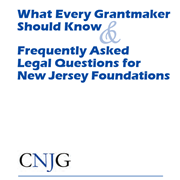Site Search
- resource provided by the Forum Network Knowledgebase.
Search Tip: Search with " " to find exact matches.
Publication Date: December, 2010

This guide was designed to help the state’s philanthropic community understand their ethical, legal, and fiduciary requirements and obligations.
Resource Type: CNJG Documents/ReportsResource Guide
Audience: All Funders
Topic: Governance
Publication Date: February, 2012
Resource Type: Report
Audience: All FundersNon Profit Staff
Topic: Strategy & Collaboration
